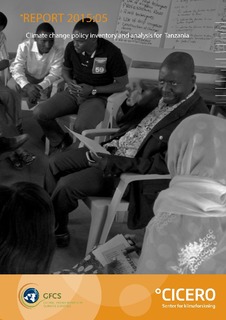Climate change policy inventory and analysis for Tanzania
Research report
Permanent lenke
http://hdl.handle.net/11250/2367251Utgivelsesdato
2015Metadata
Vis full innførselSamlinger
- CICERO Reports [210]
Sammendrag
This report is an output of the Global Framework for Climate Services Adaptation Programme in Africa. The goal of the report is to: 1) assess the extent to which climate change concerns have been integrated or mainstreamed into national policy documents in mainland Tanzania, 2) to consider the role of climate services in achieving national sectorial policy goals, and 3) identify entry points for the further development of climate services within the current policy frameworks. Fifteen key policy documents relevant to economic development, climate change and environment, agriculture and food security, disaster management and risk reduction, and health planning were analysed. Three major findings emerged from this analysis. First, while climate change is addressed in a number of the policy documents, the concept of climate services was not. Second, policy documents across all sectors identified improved early warning systems as a specific objective. This represents a common entry point for development and delivery of climate services, as well as an opportunity to increase cross-sectorial adaptation coordination and planning. Third, the analysis highlighted that efforts to manage short- and long-term climate risks are not well integrated under current policies and legislation in Tanzania. Additionally, we found that the National Environmental Policy and National Environmental Management Act are the primary policy documents that oversee climate change-related issues. It will be important to link the development and delivery of climate services with the established institutional structures for climate change adaptation under these current policies and legislation, to avoid creating isolated or duplicative institutional arrangements. Based on these findings, several recommendations are made that can inform climate services development and delivery in Tanzania.

